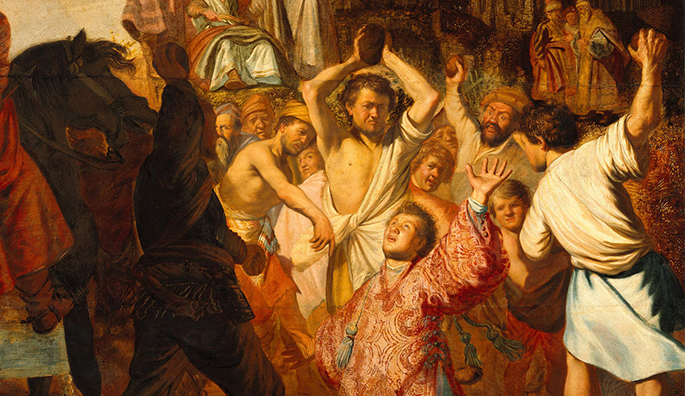The Baptism of the Lord
“You are my beloved son; with you I am well pleased.” (Mk. 1, 11)
One of the most striking and remarkable passages in all of St. Paul’s writings is in the letter to the Philippians. Paul summarizes his view of who Jesus is in these words:
“He emptied himself, taking the form of a slave, coming in human likeness … he humbled himself, becoming obedient to death, even to death on a cross. Because of this, God greatly exalted him and bestowed on him the name that is above every name.”
This process of self-emptying, summarized in the Greek word kenosis, began when John baptized Jesus. Each of the three synoptic gospels – Mark, Matthew, and Luke – begins its story of Jesus with his experience of baptism.
According to them, it was at this moment in the river Jordan some 2000 years ago that a world-shattering event took place – God spoke words the likes of which had never been heard before:
“You are my beloved Son; with you I am well pleased.”
What the gospel writers struggle to express through mere words is that a life-changing, world-shattering event took place – an occurrence so extraordinary that they pushed themselves to the limit to communicate how remarkable this happening was.
This experience of joining humanity with divinity – God’s magnum opus, if you will – is so ineffable and indescribable that it took the Church some 400 years to accomplish the task. Still, to this day, the whole notion of the dual substance of Christ – being both man and God – remains a deep mystery to all of us.
The gospel of Mark that we heard today attempts to address this mystery through three images:
The heavens being opened.
The Spirit of God descending upon Jesus like a dove.
God speaking the words “You are my beloved Son.”
Taken together, what these three descriptions tell us is that something utterly unique has occurred:
The man Jesus has been seized by God’s love and has become one with Abba, Father God.
On a purely human level, this event transformed Jesus. He was changed in a primal way by the activity of God’s grace. From that moment on, Jesus left his home, left his work, left his family, and abandoned himself fully to the grace of God’s Spirit.
This is how spiritual writer, Max Lucado, describes the potential power of the kind of grace active in this historic event:
“God’s grace has a drenching about it. A wildness about it. A white-water, riptide, turn-you-upside-downess about it. Grace comes after you. It rewires you. From insecure to God secure. From regret-riddled to better-because-of-it. From afraid-to-die to ready-to-fly. Grace is the voice that calls us to change and then gives us the power to pull it off.”
This is the grace the man Jesus experienced at the Jordan. This is the grace that pushed him ahead into his public ministry of radiating and spreading the unfathomable love of a Father God. This is the grace that made it possible for Jesus the man to empty himself and “take on the form of a slave, and become obedient unto death, even death on a cross.”
The baptism of Jesus demonstrates definitively whose side God is on:
Ours!
It demonstrates that because it declares once and for all that God’s abundant mercy is available to every one of us – even to the point of you and me becoming a son and daughter of God in our own right. It is a gift accessible to all. Our task is to accept it and allow it.
In other words, this baptism event first tells us who Jesus is and what his ministry is about. It then tells us about the meaning of our own baptism.
And what it tells us is our baptism is a declaration on our part of who Jesus is and what his ministry is about for us.
Baptism is a public statement of our commitment to do as Jesus did, to live as Jesus lived, to love as Jesus loved – to become a child of God like Jesus.
Most of us Catholics, of course, were children when we were baptized so that we could enter into a family, a community of people who would nurture that faith life that treasured the meaning of baptism.
Now, as adults we need to re-view its meaning and re-dedicate ourselves to its purpose.
Our baptism needs to be a public commitment to embrace the alternative lifestyle that Jesus himself lived out. It is a testimony on our part that we believe we are called to empty ourselves of our addiction to our own ego needs, to humble ourselves through dying to the compulsions of our own self-interests, to begin seeing with a new set of eyes that allows us the freedom of recognizing the needs of those around us who are enslaved and held hostage by mental illness, by poverty, by hunger, by homelessness, by imprisonment, by deprivations of all kinds.
Our own baptism should make us open to hearing these words of the prophet Ezekiel and allowing them to resonate deep within us:
“I will give you a new heart and put a new spirit within you.”
Simply put, Ezekiel is saying that our own baptism should lead us to a kind of spiritual heart transplant.
The result of obtaining that new heart would be a positive “yes” to the following questions:
“Have you been changed by grace?
Have you been emboldened by grace?
Softened by grace?
Snatched by the nape of your neck and shaken to your senses by grace?”
That’s what Jesus’ baptism did to him.
What about your baptism? What’s it done to you?
Ted Wolgamot, Psy.D.
NOTE: The teachings of John the Baptist:
His diagnosis concerning the root of all Israel’s dire problems was singular: sin. His diagnosis was that God’s plan for Israel had ended in total failure and Israel could no longer rely on the old ways of to renew the history of God’s efforts to save his people.
His remedy: Israel must confess its terrible sins and be radically converted to God. A total purification was needed. His belief was that God was angry that the Jewish people had broken their covenant relationship with Him. The source of all their grief was God’s anger and desire to punish them.
The gift of baptism would appease God and lead his people into living out a new covenant with God.
NOTE: The teachings of Jesus of Nazareth:
Though baptized by John, a different conviction was birthed within him. A new plan took root in his mind and heart. Jesus was seized with the conviction that everything should be seen in the context, not of God’s anger, but in God’s unimaginable mercy. God was not about anger and judgment, but about mercy and compassion.
Yes, the people need a conversion of heart and soul, but it will not be achieved through appeasement or anger, but through embracing a lifestyle that reflects who God really is: Love, Mercy, Forgiveness.
Jesus’ whole life then became dedicated to living out and preaching that belief about God, his Abba.
As a consequence, Jesus replaced John the Baptist’s prophetic manner and strategy. He replaced the austere life of the desert with a festive lifestyle. He offered a banquet to be shared by all and made it an expressive symbol of a people embracing the fullness of life that willed for them.
Jesus spoke repeatedly of the nearness of God. The fear of terrible judgement and wrath was replaced by an invitation to total trust in Abba, Father.
God was not only coming to judge. He was coming to liberate people from terrible suffering and oppression. This was the Good News! God is present among them, not to oppress and judge, but to liberate and invite.
- Based on the writing of the scripture scholar, Jose Pagola, S.J., in his book Jesus: An Historical Approximation







